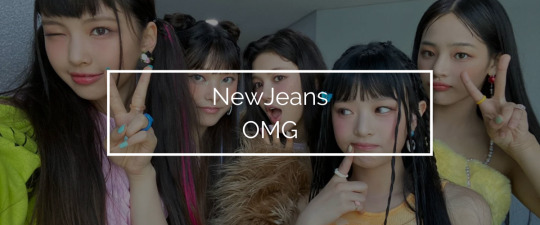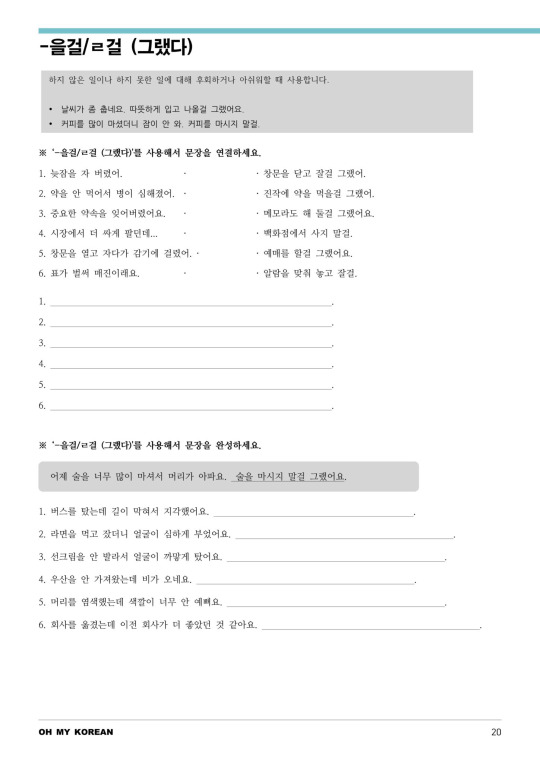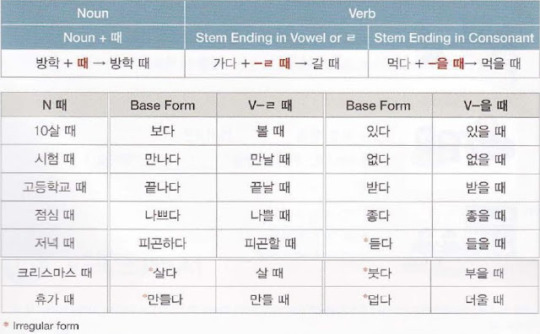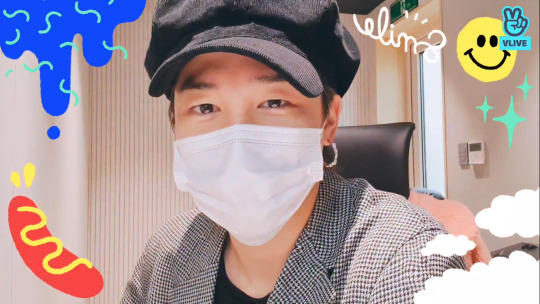#(을/ㄹ) 때
Text
V1 STEM{*(v,ㄹ)}ㄹ 때 ... V2 • V1 STEM{≠(v,ㄹ)}을 때 ... V2
[...l ttae ...] • [...·eul ttae ...]
(simultaneity; circumstances/background information of an event; action 1 triggers action 2) (generally speaking; when something applies everytime for that occasion, at that precise moment) when ... V1, ... V2
If V1 STEM ends with a vowel or ㄹ ➡ ㄹ 때 suffix
If V1 STEM ends with any other consonant ➡ 을 때 suffix
0 notes
Text
One-Page Masterlist
안녕하세요! Hey everyone! I recently got an ask about my old masterlist, which is the same as my broken-down masterlist except it has all of my lessons on one page, rather than on multiple separate posts. Some may find this expanded version easier to navigate, so I’ll keep this up for y’all! My broken-up masterlist, of course, will still be available for those who find that more helpful :)
Hangul Lessons
Consonants
Vowels
Writing/Reading Korean Syllables
Some 받침 Rules
Diphthongs
Stroke Order
Some More 받침 Rules
Irregular Verbs
The Basics
Common Phrases
Numbers
Sino-Korean vs. Native Korean Numbers (Instagram Post)
Sentence Structure and Particles
Present-Tense Conjugations and Formal Language
Adjectives
Questions
Honorifics and Casual Language
Beginner
Negative Sentences
잘 and 못
Past Tense
Future Tense (-ㄹ / 을 것이다)
-ㄹ / 을 까요? (Shall we…? / I wonder…?)
-(으)세요 (Giving Commands / Asking Questions)
Telling Time
-고 싶다 (I want to…)
How to Say “And”
-지만 (However)
아/어/여서 (So…)
Negative Commands
Spacing (띄어쓰기)
Adverbs
ㅂ Irregular
Comparatives and Superlatives
난, 날, & 내가
Upper-Beginner
-(으)면 (If…)
아/어/여도 (Even though…/Even if…)
(으)면 되다 / 아/어/여도 되다 (I can…/You may…)
-아/어도 되다: Asking for and Giving Permission (Instagram post)
-(으)면 ���다 & -(으)면 안 되다 (Instagram post)
아/어/여야 되다 and 아/어/여야 하다(Have to / Should)
Present Progressive (-고 있다)
How to Say “Or”
-아/어/여하다
All About 중
How to Use -(으)로
Before & After
-ㄴ/은 채로
Intermediate
Describing Nouns with Verbs (-는 것)
Describing Nouns with Verbs - Past & Future Tense (-ㄴ/은 / -ㄹ/을 것)
Nominalization
것 같다 (I think… / It seems…)
-러 가다 / -러 오다
-(으)려고 (In order to…)
-기로 하다 (to Decide to do Smth)
척하다 (To Pretend)
-게 되다
-군요 / -구나
아/어/여 보다 (to try…)
-은/ㄴ 적 있다 / 없다 (I have / have not)
-ㄹ/을 게요 (Future Tense)
겠다
-ㄹ/을 수 있다/없다 (I can / cannot)
-ㄹ/을 때 (When…)
-ㄴ/는다면 (If)
-(으)면서 and -(으)며
-(으)니까 (Because / So)
-아/어/여주다
-(ㄴ/는)다 (Narrative Form)
Quoting
Let’s…
Quoting continued
(으)ㄹ래요? (Wanna…?)
-죠
-대로
More Quoting - 대 & 래
잘하다 & 못하다 vs. 잘 하다 & 못 하다
-아/어 가지고
-(으)려면
-는 길에 & -는 길이다
-(으)면 vs. -ㄴ/는다면 (Instagram Post)
-았/었을 것이다
-느라고
-는 데(에)
-ㄹ/을 뻔하다
Upper-Intermediate
-ㄴ/는데
-(으)ㄴ/는지 (Whether or not)
-(이)라는…
All About 아무리
-잖아요
Expressing Surprise
-시 (Honorific)
Making Comparisons
-아/어/여지다
I might…
So that…/To the point where…
Causative Verbs
시키다
Passive Verbs (part 1)
Passive Verbs (part 2)
-ㄴ/은가 보다 & -나 보다 (I guess…)
-ㄹ/을수록
Other Meanings of 싶다
-자마자 & -는 대로(As soon as…)
-긴 하다
-치고
-김에
차라리 (Rather)
-(으)ㅁ Nominalization
-기는 무슨 & -기는 개뿔
-고 보니까
-듯(이)
버리다
-(으)면 좋겠다 & -(으)면 하다
-길 바라다
Advanced
-거든(요)
-줄 알다/모르다
-ㄹ/을 테니까 and -ㄹ/을 텐데
-았/었던
아니라 and 대신에
-ㄹ/을 리가 없다
편이다, 별로, and More
-지 그렇다 (Why don’t you…?)
-ㄹ/을 걸
-ㄹ/을 까 보다
-다면서요
-다니 part 1
-다니 part 2
뜻이다 & 말이다
-다가
-더라고(요)
-더니
Some colloquialisms: 아니시에이팅 and 뭐 이렇게
-(으)ㅁ Sentence Ending
-다 보니까
What does 따위 mean?
-ㄴ/는데도
Korean Idioms
Vocabulary
Must-Know People
Must-Know Places
Must-Know Things
Must-Know Verbs
Must-Know Adjectives
Countries
Months, Days of the Week, and More
Clothing (옷)
School (학교)
Autumn (가을)
Autumn (w/Pictures!)
More Questions
House / Apartment (집 / 아파트)
Emotions / Feelings ( 감정)
Animals (동물)
Loan / Konglish Words
Food and Drink (먹을 것과 마실 것)
Parts of the Body (몸)
Counters
Modes of Transportation (교통 수단)
Colors (색깔)
Colors (with Pictures!)
Weather (날씨)
Winter (겨울)
Music & Instruments (음악과 악기)
Baking Gingerbread Cookies
Emergency (비상)
Hygiene & Bathroom (위생 & 화장실)
Indefinite Pronouns
Work / Office (일 / 사무실)
Spring (봄)
Coronavirus Prevention (코로나바이러스 방역)
How to Wash Your Hands (손을 씻기)
Time (시간)
Korean Cuisine (한식)
Summer (여름)
Summer (여름) w/Pictures!
Graduation (졸업)
Identity (독자성)
Korean Text Slang
Similar Words
Makeup w/Pictures! (화장품)
Family (with Pictures!)
Pronouns
How to Say “Still” and “Already” in Korean
Tastes & Textures (맛과 질감)
K-Pop Audition
K-Pop Fandom Terminology
Different Ways to Say “Change”
Flower Names
What Does 원래 Mean?
What does 오히려 Mean?
College
Hanja Lessons
최
수
악
식
급
동
부 & 불
애
출
퇴
예
음
중
학
습
연
생
대
입
인
문
감
과
원
특
만
후
무
Charts
Present, Past, and Future Tense
Question Words
잘 vs. 못 and Negative Conjugations
Future Tenses
-았/었던 vs. -던 (at end of lesson)
Particles
Some 받침 Rules
Gifving Commands
Conjunctions and -아/어/여서 vs. -(으)니까
-(으)면 vs. -다/라면 and Different Ways to Say “And”
How to Say “Or” (at end of lesson)
Telling Time (at end of lesson)
Comparatives and Superlatives
잘하다 & 못하다 vs. 잘 하다 & 못 하다 (at end of lesson)
Comparing 잘하다/못하다, 잘 하다/못 하다, & 수 있다/수 없다
Irregular Verbs
Pop Quizzes
Level 1
K-Pop Breakdowns
TXT - “Cat & Dog”
Twice - “Feel Special”
Enhypen - “Fever”
2NE1 - “Go Away”
Lee Hi - “Only”
“기억을 걷는 시간 (Time Spent Walking Through Memories)”
KCM - “An Old Love Story (흑백사진)”
Taeyeon - “Can’t Control Myself”
Epik High - “Lost One”
Colde - “A Song Nobody Knows”
IU - “My Sea”
Enhypen - “Polaroid Love”
유라 (youra) - “하양 (RAL 9002)″
BTS - “Ddaeng”
Stray Kids - “For You”
Woozie - “어떤 미래 (What Kind of Future)
TXT - “Eternally”
LOONA - “Heart Attack”
Stray Kids - “Muddy Water”
LOONA - “Girl Front”
Pentagon - “Daisy”
BTS - “Sea”
Semester in SK
Nami Island (남이섬)
Things to Buy at Daiso
Shopping Phrases
Ordering Coffee
Signs in Korea
Ordering at a Restaurant
Riding the Seoul Subway
Things at the 편의점
Korean Curse Words
Etiquette in South Korea
Drinking Culture
Hanja in Real Life
Holidays in South Korea
Korean Cuisine
Concert Ticketing in South Korea
K-pop Comebacks in Korea
Summer in South Korea
What I Learned
#korean#korean language#hangul#korean grammar#korean vocab#korean vocabulary#learn korean#learning korean#langblr#Korean langblr#masterlist#apok#apopofkorean#study korean#studying korean#kpop#kpop lyrics#basic korean#beginner korean#intermediate korean#advanced korean#hanja#한국어#한글#한자#한국어 공부하기#한국어 배우기#한국어 문법#한국어 어휘#초급 한국어
2K notes
·
View notes
Photo

노래 = song
힘들다 = to be tired
울다 = to cry
옷다 = to laugh
~을/ㄹ 때 = while
달려오다 = to run towards
바쁘다 = to be busy
물어보다 = to ask
예상하다 = to expect
생각나다 = to come to mind
행운 = (good) luck / fortune
의미 = meaning
Official music video
Suggestions for other songs
#Korean#Studyblr#Study#Koreanblr#Langblr#Learn#Language#Learning#Studying#Language Learning#Vocabulary#Vocab#Kpop#Words#KVocab#NewJeans#OMG
42 notes
·
View notes
Photo

포기하고 싶을 때, 왜 시작했는지 기억하라.
When you want to give up, remember why you started
✏️ 𝐕𝐨𝐜𝐚𝐛𝐮𝐥𝐚𝐫𝐲:
1. 포기하다 (v): give up
2. 왜 (adv): why
3. 시작하다 (v): start, begin
4. 기억하다 (v): remember, recall
✏️ 𝐆𝐫𝐚𝐦𝐦𝐚𝐫:
1. V + 고 싶다 = want to do V ~ Expressing Hope
2. V + ㄹ/을 때 = = when, during ~Express the time when an action occurs or its duration
3. A/V-(으)ㄴ/는지 is a connective ending used when connecting a clause requiring additional information to the following verb. It corresponds to "who/what/where/when/how/whether/why + Clause" in English
🌸 🌼 🌻
Support me at: http://bit.ly/koreanloving
#learn korean#Korean Language#Korean Quotes#Korean Phrases#Study Korean#Hangul#Motivational Quotations#한국어공부중#한국어공부해요#한국어공부#한국어 배우기#한국어능력시험#한국어 단어#한국어공부하기#한국어 문법#한국어 공부하기#한국어배우기#한국어#명언
46 notes
·
View notes
Text
Langblr Reactivation Challenge: Week 2 Day 2 - Grammar Explanation
Okay so I have a whole wordpress blog where I (very slowly lol) post grammar explanations following the Sogang curriculum. I’m currently on level 2A, so feel free to check out my posts over there if you’re just starting out!
But to keep up with this reactivation challenge, here a short version of the next grammar pattern I'll be posting:
~을 때
한국에 처음 왔을 때는 한국말 못 했어요. // When I first came to Korea, I couldn't speak Korean.
춤을 출 때 기분이 좋아~ // I'm happy (my mood is good) when I dance~
수업을 할 때 마스크를 착용합니다. // We wear masks when we teach class.
This pattern attaches to verbs and adj. to express when/while [verb/adj], [2nd verb/adj] occurs or occurred.
It's usually translated to when or while in English, but keep in mind it's not used for questions like "When did you...?" or "What time is...?" Those use the interrogative 언제.
The Form
To use ~을 때 first look at the word stem:
If it ends with a consonant, add ~을 때
먹다 ⇒ 먹을 때 - 한국 사람들은 밥이나 국을 먹을 때 숟가락을 사용해요 // Koreans use a spoon when eating rice or soup.
If it ends with a vowel, add ~ㄹ 때
하다 ⇒ 할 때 - 일할 때 음악을 들어요? // Do you listen to music while working?
Irregulars
For ㄷ irregular: the ㄷ becomes ㄹ after you add ~을 때
듣다 ⇒ 들을 때 - 그 노래를 들을 때 눈물이 나요. // When I listen to that song, I cry.
For ㅂ irregular: the ㅂ becomes 우, then add ~ㄹ 때
춥다 ⇒ 추울 때 - 날씨가 추울 때 옷을 따뜻하게 입으세요. // When the weather is cold, please dress warmly.
For ㄹ irregular: ~ㄹ 때 replaces the ㄹ
살다 ⇒ 살 때 - 미국에 살 때 자전거로 출퇴근했어요. // When I lived in the US, I commuted by bike.
#langblr#langblr reactivation challenge#language learning#korean#한국어#studyblr#grammar#learning korean#korean language
29 notes
·
View notes
Text

✈️3 Korean Dialogues
about vacation and travel🏝
DIALOGUE #1:
곧 여름 휴가인데 휴가 때 뭘 할 거예요?
The summer vacation is coming soon; what would you like to do during the vacation?
국내 여행을 하고 싶은데 좋은 곳을 알아요?
I want to travel around the country; do you know a good place to go?
저는 작년에 제주도에서 자전거로 여행을 했어요. 경치가 아름다웠어요.
I travelled around in Jeju Island by bicycle last year. The scenery was beautiful.
저는 차로만 여행을 해 봤는데 자전거 여행도 좋을것 같아요.
I travelled around only by car, but it would be good to travel around by bicycle.
Vocab & Grammar List:
곧 - soon
여름 휴가 - summer vacation
여름 - summer
휴가 - vacation
인데 - Noun + But (..but noun)
Noun + 때 - when
뭘 - 뭐 + 를 = what
뭐 하다 - (literally - what do.) what are you doing
ㄹ 것이다 - future tense; will
국내 여행 - Domestic travel
고 싶다 - want to do
좋다 - to be good
은/는 것 - adjectives describe nouns
좋은 곳 - a good place
곳 - place
알다 - to know
작년에 - last year
제주도 - Jeju island
자전거로 - by bike, using a bike
여행을 하다 - to travel
경치 - the sights, views
아름답다 - beautiful
차로만 - only by car
차 - car
(으)로 - describe the tool or method used (by/with/to/using)
만 - only
아/어해 보다 - to talk about experience
ㄹ/을 것 같다 - I think that,.. It seems like,.. (about future situation)
DIALOGUE #2
혼자 여행을 한 적이 있어요?
Have you travelled alone before?
아니요, 혼자 여행을 한 적이 없어요. 서연 씨는요?
No, I have not travelled alone before. How about you Ms. Seoyon?
저는 혼자 여행을 자주 해요. 혼자 여행하면 마음대로 구경하고 쉴 수 있어서 좋아요.
I travel alone frequently. It's nice to be able to look around and take a rest at my disposal if I travel alone.
저도 혼자 여행을 해 보고 싶어요.
I would like to travel alone.
Vocab & Grammar List:
혼자 - alone
여행하다 - to travel
ㄴ 적이 있다 - have done before
아니요 - no
ㄴ 적이 없다 - have not done before
서연 씨는요? - what about you seo-yeon?
(Name)는요/은요 - ask another person their opinion
자주 - often
(으)면 - If; when
마음대로 - as one pleases
구경하다 - to sightsee
-고 - and
쉬다 - to rest
ㄹ 수 있다 - can do
아/어서 - because; so
좋다 - to be good
저도 - me too
DIALOGUE #3
지금까지 여행한 곳 중에서 어디가 제일 좋았어요?
Where is the best place you have travelled so far?
저는 재작년에 간 프랑스가 좋았어요.
I liked France that I went to the year before last.
왜 거기가 제일 기억에 남아요?
Why is there the most memorable place?
박물관과 미술관이 많아서 좋았어요. 그리고 시골 풍경이 아주 아름다웠어요.
It was nice because there are many museums and art galleries. And the scenery in the countryside was so beautiful.
Vocab & Grammar List:
지금까지 - until now
여행한 곳 - a place I traveled
중 - middle
중에서 - among the other things/options
어디 - where
제일 - most
재작년에 - the year before last
간 프랑스 - France I went to
왜 - why
거기 - there
제일 기억에 남다 - the most memorable
기억 - memory
남다 - to remain
박물관 - museum
와/과 - and
미술관 - art museum
많다 - to be a lot
그리고 - and (conjunction)
시골 풍경 - scenery if a countryside
풍경 - scenery
아주 - very
아름답다 - to be beautiful
#한국어#korean langblr#korean conversation#korean dialogue#beginner korean#intermediate korean dialogue#beginner korean dialogue#how to speak korean#여행#한국어 공부#korean practice
22 notes
·
View notes
Text
~(으)ㄹ 걸 그랬다
[This post features songs by BIGBANG and iKON]
This phrase is used "for self-reflection and is a way to express regret for not doing something one feels should have been done" (1). This phrase is similar to saying "I should have" or "I would have". When using informal speech, "그랬다" is omitted.
Sentence Structure(s)
1. verb (without 받침) + ㄹ 걸 그랬다
Ex. 시험이 너무 어려워서 시험을 망쳤어요. 이렇게 시험이 어려울 줄 알았으면 공부를 더 많이 할 걸 그랬어요. (The test was so difficult that I failed it. If I had known it would be that hard, I would have studied more.)
Ex. 친구랑 놀러 갔는데 갑자기 비가 왔어. 가지 말걸. (I went out with my friend, but it suddenly rained. I shouldn't have gone out.)
*예문 taken from Self Study Korean
2. verb (with 받침) + 을 걸 그랬다
Ex. 치마를 입고 운동을 하니까 불편하네. 바지를 입을걸. It's uncomfortable to exercise while wearing a skirt. I should have worn pants.
Ex. 친구 생일에 음식을 너무 많이 먹어서 배탈이 났다. 음식을 조금만 먹을 걸 그랬어요.
At my friend's birthday, I ate too much food and got an upset stomach. I should have eaten less food.
*예문 taken from Let’s Study Korean
~(으)ㄹ 걸 그랬다, the k-pop way
"Goodbye goodbye 이별을 알았다면
그토록 사랑하지 말 걸 그랬나 봐요"
-from Goodbye Road by iKON
Meaning: Goodbye. Goodbye. If only I knew we’d say goodbye, I wouldn’t have loved you this much.
"있을 때 잘할 걸 그랬어"
-from IF YOU by BIGBANG
Meaning: I should’ve treated you better when I had you.
*가사 taken from Color Coded Lyrics
**워크시트 taken from Oh My Korean

1 note
·
View note
Text
[Korean Lyrics Breakdown] Onew - 보통의 밤 (Always)
토성이 물고기자리 들어간 후에 매일 새벽에 깨어난다.
이럴 때마다 이 곡이 생각난다.
몇 번 들어도 눈물나게 하고 힐링도 된다.
가사가 마지막에 ‘always’ 빼고 거의 다 한글이니까
한국어 공부에 좋다 ㅋㅋ
Lyrics taken from Melon. Refer to this tweet for English translation
youtube
Support me at Ko-fi | Ask/Request
시간은 가고
불안함이 널 삼킬 때
그 어떤 날도
난 한결같이 네 밤을 지킬게
난 여전히 너의 곁에 Always
시간 : time that passes naturally
가다 : for time to pass or flow
불안하다 : to be uneasy, anxious
-ㅁ/음 : word ending that makes the preceding statement function as a noun
널 = 너를 : you
삼키다 : to swallow
-ㄹ/을 때 : expression used to indicate the duration, period or occasion of a certain act or situation
그 : pronoun used to indicate the previously-mentioned object or something the listener has in mind
어떤 ~도 : any
날 : day
난 = 나는 : I
한결같다 : to be the same from the beginning to the end
한결같이 : constantly, unchangingly, consistently
네 = 너의 : your
밤 : night
지키다 : to look after, take care of
-ㄹ/을게 : sentence ending used when the speaker promises or notifies the listener that he/she will do something
여전하다 : to be the same as before
여전히 : still, as ever
곁 : side; next to or very close to someone or something
Support me at Ko-fi | Ask/Request
0 notes
Text
(ㄹ/을) 때 — When
Can also translate to while/during.
Can add 마다.
Noun: N + 때
방학 때 = During vacation / When it’s vacation
20살 때 = When I was 20 years old
그때 = During that time
점심 때 = During lunch / When it’s lunch
Adjective: A + ~ㄹ/을 때
더울 때 = When it’s hot
나쁠 때 = When it’s bad
피곤할 때 = When I’m tired
행복할 때 = When I’m happy
Verb: V + ~ㄹ/을 때
읽을 때 = When I read
입을 때 = When I wear
들을 때 = When I hear
배울 때 = When I learn
Past: A/V/N + ~았/었을 때
공부했을 때 = When I studied
왔을 때 = When I came
어렸을 때 = When I was young
학생이었을 때 = When I was a student

0 notes
Text
-는 동안 VS. -(으)면서 [+ (을) 때]
anon asked: what’s the difference between -는 동안 and -(으)면서? I’m so confused
This is a great question! I am assuming you’re asking because they can be translated as the same thing into English. I understand why there will be confusion because, under context, these grammar points aren’t really distinguishable in English as they are in Korean.
-는 동안; while, during [go here for more]
Use this when:
You’re not talking about the same doer of the action [엄마가 설거지를 하는 동안 아빠는 화장실을 청소했어요 - Mom cleaned the dishes while dad cleaned the bathroom]
You are talking about the same doer of the action [어제 공부하는 동안 문제가 생겼어요 - I found a problem while studying yesterday]
The doer of the action is inanimate [비가 많이 오는 동안 구름이 어두워졌어요 - the clouds darkened while it poured]
Try to remember that 동안 is used for a period of time; “-는 동안”은 일정 기간 동안 사용되다. Consider the example in the first rule. Think of the context of this sentence as: during the time it took for my mom to do the dishes, my dad cleaned the bathroom. Yes, you can switch it around because contextually it means the same thing, “아빠가 화장실을 청소하는 동안 엄마는 설거지를 했어요.”
NOTE: Because “-는” attaches to the dependent clause [엄마가 설거지를 하는 동안], the verb before it does not take tense and underlyingly takes the tense of the independent clause’s verb [아빠는 화장실을 청소했어요]. I used the past tense [과거] in my examples, but you can use the present tense [현재] or future tense [미래], obviously, depending on what you want to say.
More Examples:
한국에서 사는 동안 한국어를 빨리 배웠어요 - While I lived in Korea, I learned Korean quickly.
대학교 디니는 동안 어디에서 살 거예요? - Where are you going to live while attending University?
아빠가 저녁을 준비하는 동안 저는 보통 숙제를 해요 - I usually do my homework while my dad makes dinner.
희주가 세수하는 동안 혜민은 이를 닦았어요 - While Heeju washed her face, Hyemin brushed her teeth.
제가 자는 동안 고양이는 제 식물을 먹었어요 - While I slept, my cat ate my plants.
-(으)면서; while
Use this when:
The doer of the action is the same [희주는 먹으면서 유튜브를 봐요 - Heeju watches YouTube while eating]
The action is happening simultaneously [지하철을 기다리면서 친구하고 전화했어요 - I waited for the metro while I called my friend]
Contrasting two actions [대현은 한국에서 일하고 싶다고 하면서 한국어를 못해요 - Daehyun said they wanted to work in Korea, but they don’t speak Korean]
NOTE: You can only use -(으)면서 when talking about the same doer of the action or state. For example, 희주는 일하는 동안 음악을 들었어요 and 희주는 일하면서 음악을 들었어요. BOTH work and are grammatically correct. The working and listening to music is being done by 희주, whether at the same time, or during work. However, a sentence like “희주는 일하면서 혜민은 음악을 들었어요” is grammatically incorrect. Even if 희주 and 혜민 are doing this at the same time, you must use -는 동안.
More Examples:
샤워하면서 노래를 불렀어요 - While showering, I sang
요리하면서 요리법을 봐요 - While cooking, I read a recipe
수업을 들으면서 메모를 해요 - I take notes while in class
운전하면서 문자를 보내지 마세요 - Don’t text while driving
희주는 숙제를 하면서 음악을 들어요 - While Heeju does her homework, she listens to music
Differences between the two:
You can use 동안 with nouns [명사], you cannot use (으)면서 with nouns. However, you can use (이)면서 with nouns in conjunction with 이다 [저는 대학생이면서 선생님이에요 - I am a university student and a teacher]. This expresses two states of being that happen at the same time.
You can not use -는 동안 to contrast actions
You MUST use the same doer of action with (으)면서
-는 동안 expresses an action that occurs during a period of time; -(으)면서 does not necessarily take place at a specific time
Similarities between the two:
You attach tense at the end of the sentence, you cannot attach tense to the dependent verb
They are, most of the time, interchangeable; just remember the rules above
BONUS! -(을/ㄹ) 때; when
The closest origin of “때” I could find in 한자 is “時”. “때” refers to an event/time/period of action (another translation of 時 can be 시).
Things to remember:
You can use -때 with nouns and -(을/ㄹ) 때 with verbs.
Because it refers to a specific moment, you can attach tense to -(을/ㄹ) 때
You can use this with adjectives!
Can be used with -까지 and -부터! [때 + 부터 = since // 때 + 까지 = until]
Examples:
비행기를 도착할 때 엄마하고 전화할게요 - When my plane lands, I’ll call my mom
대학생[이였을] 때 돈이 없었잖아요 - When I was a uni student, I didn’t have money, as you know
한국 친구에게 한국말로 하기 시작했을 때 마이클은 깜짝 놀랐어요 - When I started speaking Korean to my Korean friend, Michael was surprised!
공부할 때 음악을 들어요 - When I study, I listen to music
시간이 있을 때 알려주세요 - Let me know when you have time
16살 때부터 한국어를 배웠어요 - I’ve been learning Korean since I was 16
이렇게 될 때까지 더 씻어야 해요 - You have to wash it more until it’s like this
한국에 갈 때 홍대하고 제주도 방문하고 싶어요 - When I go Korea, I want to visit Jeju and Hongdae
혜민 언니는 한국에 들어갔을 때 제가 너무 슬펐어요 - I was so sad when Hyemin when back to Korea
어렸을 때 그림을 그리기 시작했어요 - I started drawing when I was a kid
Hope this helps! If there’s any more confusion, please, don’t hesitate to send another message or ask!
Happy Learning :)
~ SK101
#korean#korean language#korean ask#ask#korean blog#korean language blog#south korea#korean language tips#what's the difference#Know the difference#korean grammar#한국어#한국어 배우기#한국어 공부하기#한국어 블로그#한국 문화#한국어 문법#한국어 예문#한국어 질문#한국어 차이#-는 동안 vs -(으)면서#(으)면서#-는 동안#-때#(을/ㄹ) 때#kblr#kblog#klangblr#klanguage blog
134 notes
·
View notes
Text



정말 가깝다고 느끼는 친구들은 아직 미국에 있으니까 because the friends that I feel really close to are still in America
• 정말 really, very
• 가깝다 close
• -(ㄴ/는)다고 to say that, quote (often used with words like 말하다/하다/쓰다/적다/부르다/etc.) this structure is only used with verbs
• 느끼다 to feel
• -(으)ㄴ/는/(으)ㄹ changes verb into adjective (past, present, and future tense)
• 친구 friend
• -들 plural marking particle
• -은/는 topic marking particle
• 아직 still, yet
• 미국 America, USA, the US
• -에 location marking particle
• 있다 there is, be
• -(으)니까 because, so
그래서 가끔은 정말 그립죠 so sometimes I really miss it
• 그래서 so, therefore
• 가끔 sometimes
• 그립다 to miss
• -지/죠 of course (-지/죠? right?)
음악을 안 했던 그때가 그리울 때도 있죠 there are times I miss the days before I made music too
• 음악 music
• -을/를 object marking particle
• 안 not
• 하다 to do
• -던 used to (not happening anymore), past tense
• 그때 that time, those times
• -이/가 subject marking particle
• 때 a time
• -도 too, also, as well
95 notes
·
View notes
Text
MUSICAL MONDAYS WEEK 2!

Happy Monday everyone! I hope you all had a beautiful weekend and are all well rested.
It's that time of the week where I'm back with another study post! Whoop whoop.
The song this week absolutely slaps! I can't stop singing it. @tell-tale-taeil Thank you so much for recommending this for my Musical Monday's. Your taste in music is 10/10!
Song: Boat 보트
Artist: George 죠지
My thoughts on the song: If you're looking for a fun and light hearted little number I strongly recommend this. I can't stop singing the lyrics. The other day I was making a cup of tea, and out of nowhere I scream sung 'I'M ON A BOAT' much to the surprise of my mum, who rightly looked at me with concern. Sorry mum. The lyrics are stuck in my head and need an outlet. Great song. Go give it a listen when you have a few moments to spare. I warn you though, you will end up shouting "I'm on a boat" at random and sporadic moments throughout the day after hearing this! 😄
Notes: As I am still not 100% fluent in Korean, my study sentences are for me to practise writing in Korean. So there might be a few mistakes. If you spot any or a better way to translate a sentence, please let me know so I can correct it!
Translation Notes: I have included a mixture of my own sample sentences, Papago translation and Naver Dictionary. Where sentences are not my own I have labelled them.
Let's get this study show on the road!
VOCABULARY:
사방에 on every side/ on all sides/ all around/ everywhere
산지사방 all directions (Naver) Can also mean ‘Mountainous area’
사방에서 from every direction
사방에 벌들이 날고 있었어요! Bees were flying everywhere! (Nuance: Surrounded by bees on all sides)
사방을 살펴보다 look all around (Naver)
새 카페들이 사방에 생겨나고 있죠? New cafes are popping up everywhere, right?
사방을 살피다 Keep a sharp lookout (Naver)
산지사방으로 흩어지다 scatter/ be dispersed in all directions (Naver) (Scatter all over the country)
사방으로 싸다니다 bustle in and out/ hang about (Naver)
사방으로 비산하다 fly in all directions (Naver)
벌들은 사방으로 비산해고 있어요! Bees are flying everywhere!
새들은 사방으로 비산했어요. The birds scattered in all directions.
올리다 raise/ lift up/ achieve/ gain
Present Tense: 올려요
Past Tense: 올렸어요
Future Tense: 올릴 거예요
Nominal: 올림
Contrast: 올리지만
이자율을 올리다 raise/ drive up the interest rates (Naver)
기름 값을 올리다 raise the gas rates
이번년에서 가스회사는 기름값을 30%로 올렸어요. This year, the gas company raised the price of oil by 30%. (Mine + Papago)
저는 연간 3천만 원의 소득을 올리고 싶어요. I want to make a yearly profit of 30 million won a year. (Roughly £18,738.69) I want to earn 30 million won a year.
오른팔을 올릴 때 아픈가요? Does it hurt when you raise your right arm?
쏘아 올리다 launch/ shoot up/ send off (Naver)
로켓을 쏘아 올리다 Launch a rocket (Naver)
선취 득점을 올리다 score the first point on a game/ get on the score board first (Naver)
블로그에 글을 올리다 write on a blog (Naver) Post something on a blog.
오늘은 뮤지컬 월요에 대한 글을 블로그에 올리려고 해요. Today, I am going to blog about musical Mondays.//Today, I'm going to post a blog about musical Mondays.
페널티킥으로 득점을 올리다 score on a penalty kick (Naver)
머리를 올리다 put one’s hair up (Naver)
멀어지다 recede/ die away/ drift apart/ grow apart
Present Tense: 멀어져요
Past Tense: 멀어졌어요
Future Tense: 멀어질 거예요
Contrast: 멀어지지만
사이가 서로 멀어지다 Become estranged from each other
윤아 씨는 친구들과 사이가 멀어졌어요. Yoona has become estranged from her friends.
원하다 want/ wish/ hope/ desire
Present Tense: 원해요
Past Tense: 원했어요
Future Tense: 원할 거예요
Contrast: 원하지만
미나는 미래에 파리 미대에서 공부하기를 원해요. Mina wants to study at the Paris Academy of Fine Arts in the future. Mina hopes to study at the Paris Academy of Fine arts in the future.
다 사람들은 많이 돈을 원해요. Everyone wants a lot of money.
저는 천체물리학자가 되기를 원했어요. I wanted to be an astrophysicist.
탐욕스럽게 명예를 원하다 to be greedy/ hungry for fame/ honour. (Naver)
한심하다 pathetic/ pitiful
Present Tense: 한심해요
Past Tense: 한심했어요
Future Tense: 한심할 거예요 // 한심할 것이에요
Nominal: 한심함
한심하기 짝이 없다 To be extremely deplorable (Naver)
넌 한심하지 마! Don’t be pathetic!
다르다 different from/ different to
Present Tense: 달라요
Past Tense: 달랐어요
Future Tense: 다를 거예요
Contrast: 다르지만
질적으로 다르다 to differ in quality (Naver)
거리에 따라 다르다 vary with distance (Naver)
차원이 다르다 be entirely different/ belong to a different level (Naver)
생각이 다르다 have a different way of thinking (Naver)
취미가 서로 다르다 have quite different tastes (Naver)
내 친구와 나는 취미가 서로 달라요. My friend and I have different hobbies.
하루가 다르다 change from one day to the next/ rapidly change (Naver)
그는 기분이 하루가 달라요. His mood changes from one day to the next.
Another way to say this is: 그의 기분은 하루하루 변한다.
날씨는 하루가 다르다. The weather is different from day to day.
앞뒤가 다르다 to be inconstant/ to not add up. (Lit: One’s front and back are different)
그들의 이야기는 앞뒤가 달라요. 거짓말인 것 같아요. Their stories are different. I think it’s a lie.
정돈하다 tidy up/ straighten up/ arrange/ clear/ put sth in order
Present Tense: 정돈해요
Past Tense: 정돈했어요
Future Tense: 정돈할 거예요
오늘은 저의 집을 정돈했어요. I cleaned my house today. Lit: I put my house in order today. E.g I tidied my house today.
저의 주위를 정돈할 필요가 있어요. I need to organize my surroundings.
창고에 장비들이 잘 못 정돈되어 있었어요. The equipment was not well organized in the warehouse. (Modified Naver)
뜻밖의 unexpected/ unanticipated
저는 뜻밖의 희소식을 듣고 싶어요! I want to hear some unexpected good news!
어제밤에 우리는 뜻밖의 희소식을 들었어요! Last night we heard some unexpected good news! Last night we got some unexpected good news!
뜻밖의 손님이 들어왔는 것 같아요. I think we have an unexpected guest.
It seems that an unexpected guest has arrived.
뜻밖 unexpectedness/ a surprise
향하다 look/ face/ head towards
Present Tense: 향해요
Past Tense: 향했어요
Future Tense: 향할 거예요
Contrast: 향하지만
창문은 남쪽을 향해 나 있다 The window faces/ looks south. (Naver Example)
배는 바다를 향해 나아갔다 The boat headed out to sea. (Naver Example)
어선는 대서양를 향해 나아갔어요. The fishing boat headed for the Atlantic Ocean.
미나와 그녀의 가족은 도쿄을 향해 출발했어요. Mina and her family set off for Tokyo. Mina and her family departed for Tokyo.
내의 침실 창문은 숲을 향해 있어요. My bedroom window faces the forest.
마음이 고향을 향하다 To yearn for home. (Naver) Literally: My heart is heading towards my hometown.
우려하다 concern/ worry/ fear/ worry about/ fear that
Present Tense: 우려해요
Past Tense: 우려했어요
Future Tense: 우려할 거예요
많이 사람들은 경제 위기를 우려해요. Many people are concerned about the economic crisis.
우려 Concern
우려를 표명하다 Express concern over (Naver)
우려할 만한 worrying/ alarming/ serious (Naver)
Miscellaneous things I found interesting in this song!
회치다 slice raw fish/ prepared slice raw fish
회(를) 치다 prepare a raw fish dish
회 Sashimi
참치회 slices of raw tuna
모듬회 a plate of assorted raw fish
이 맥주는 회에 잘 어울리다. This beer goes well with sashimi.
GRAMMAR:
The grammar point that I have chosen from this song is an interesting one because it combines 2 grammar points into one.
ㄹ 수도 있지만: ...may happen, but....
The first grammar point in this is:
(을) ㄹ 수도 있다 – Talking about possibilities. May/ Might
It is a mixture of 을/ㄹ 수 있다 = Can/ expressing ability to do something and 도 meaning 'also'. When combined it means ‘Can also…’ = May or might.
The second grammar point is:
지만 – Even though/ but/ however
Shows a contrast between the two clauses.
Can also be used to connect two clauses together.
I will be creating separate grammar posts for each of these points listed above, otherwise this post will get real long!
When (을) ㄹ 수도 있다 and 지만 are combined it gives the impression of '....may happen but…'
Examples from the song:
큰 파도가 날 덮칠 수도 있지만A big wave might hit me,
뜻밖의 사과가 날 수도 있지만 There may be an unexpected apology/ accident.
There we go everyone! Study list complete! I hope you enjoyed studying with Musical Mondays, and that you liked listening to this amazing song too!
As always everyone,
Stay safe, have a beautiful day, and happy studying! x
Sources: Naver dictionary, Papago translation, Verbix.com, Unsplash.com.
#korean grammar#korean vocabulary#korean vocab list#studyblr#study notes#langblur#musical monday#musical mondays#Boat by George
25 notes
·
View notes
Text
Intermediate & Upper-Intermediate Lessons
Click here for the masterlist of all my lessons!
Intermediate
Describing Nouns with Verbs (-는 것)
Describing Nouns with Verbs - Past & Future Tense (-ㄴ/은 / -ㄹ/을 것)
Nominalization
것 같다 (I think… / It seems…)
-러 가다 / -러 오다
-(으)려고 (In order to…)
-기로 하다 (to Decide to do Smth)
척하다 (To Pretend)
-게 되다
-군요 / -구나
아/어/여 보다 (to try…)
-은/ㄴ 적 있다 / 없다 (I have / have not)
-ㄹ/을 게요 (Future Tense)
-겠다
-ㄹ/을 수 있다/없다 (I can / cannot)
-ㄹ/을 때 (When…)
-ㄴ/는다면 (If)
-(으)면서 and -(으)며
-(으)니까 (Because / So)
-아/어/여주다
-(ㄴ/는)다 (Narrative Form)
Quoting
Let’s…
Quoting continued
(으)ㄹ래요? (Wanna…?)
-죠
-대로
More Quoting - 대 & 래
잘하다 & 못하다 vs. 잘 하다 & 못 하다
-아/어 가지고
-(으)려면
-는 길에 & -는 길이다
-(으)면 vs. -ㄴ/는다면 (Instagram Post)
-았/었을 것이다
-느라고
-는 데(에)
-ㄹ/을 뻔하다
Upper-Intermediate
-ㄴ/는데
-(으)ㄴ/는지 (Whether or not)
-(이)라는…
All About 아무리
-잖아요
Expressing Surprise
-시 (Honorific)
Making Comparisons
-아/어/여지다
I might…
So that…/To the point where…
Causative Verbs
시키다
Passive Verbs (part 1)
Passive Verbs (part 2)
-ㄴ/은가 보다 & -나 보다 (I guess…)
-ㄹ/을수록
Other Meanings of 싶다
-자마자 & -는 대로(As soon as…)
-긴 하다
-치고
-김에
차라리 (Rather)
-(으)ㅁ Nominalization
-기는 무슨 & -기는 개뿔
-고 보니까
-듯(이)
버리다
-(으)면 좋겠다 & -(으)면 하다
-길 바라다
#korean#korean language#intermediate korean#korean grammar#korean langblr#langblr#study korean#studying korean#learn korean#learning korean#korean resource#한국어#한국어 공부하기#한국어 배우기#문법#한국어 레슨#korean lessons#korean lesson
74 notes
·
View notes
Photo

바람이 불지 않을 때
바람개비를 돌리는 방법은 앞으로 달려나가는 것이다
When the wind is not blowing,
the way to spin the pinwheel is to run forward.
✏️ 𝐕𝐨𝐜𝐚𝐛𝐮𝐥𝐚𝐫𝐲:
1. 바람 (n): wind
2. 불다 (v): blow
3. 바람개비 (n): pinwheel
4. 돌리다 (v): turn, spin
5. 방법 (n): way, method
6. 앞 (n): front
7. 달려나가다 (v): run [rush] out,
✏️ 𝐆𝐫𝐚𝐦𝐦𝐚𝐫:
1. A/V + 지 않다: Negation = not, is not, do not
e.g. 바람이 불지 않다 = The wind does not blow = no wind
2. V + 을/ㄹ 때: Express time = when, during
e.g. 바람이 불지 않을 때 = When the wind is not blowing
3. V + 는 + N: Noun modifier = N that V
e.g 바람개비를 돌리는 방법 = The way to spin the pinwheel
4. N + (으)로: Indicate the direction of a movement = Towards, to
e.g. 앞으로 달려나가다 = run forward
5. V + 는 것이다: Describing Nouns with Verbs = V-ing, the action of V
e.g. 앞으로 달려나가는 것이다 = the action of running forward
--
Kindly Visit My Blog Here
Available Products Here
Available Korean Writing Notebook Here
#korean langblr#korean quotes#motivational quotes#korean language#korean phrases#learn korean#study korean#한국어공부해요#한국어공부중#한국어공부하기#한국어 공부하기#한국어공부#한국어 단어#한국어 배우기#한국어능력시험#한국어 연습#한국어배우기#한국어문법
28 notes
·
View notes
Text
Jimin’s vlive 20.03.30
저의 화려한 등장 (my fabulous appearance) aka. Eat Jimin
I think vlives are a great way to practice listening because it’s unscripted and natural. People actually do speak like this so you can train your ears better than from songs 😊 Feedback is appreciated as always! ^^

제가 찾아왔어요 = I came to see you
➼ 찾아오다 - to come look for something. but is used also as “come to see sbd”
완벽한 생얼 = completely bare-faced
➼ 완벽하다 - perfect
➼ 생얼 is slang for no makeup, 생 = raw and 얼굴
뭐 하고 있어요 지금? - What are you doing right now?
➽ ~고 있다
아침 먹는다고요? (it was 5pm) = What? You’re eating breakfast?
➼ 아침(밥/식사) - breakfast (shortened to only “morning” from “morning meal”)
➼ 먹다 - to eat
뒹굴뒹굴하고 있으십니까?
➼ 뒹굴다 - to roll, loaf around
저는 오늘 일어나서 그... 회사에서 할 일이 좀 있었어가지고 먼저 나와서 볼일을 보고 (그리고) 좀 이따 저 일 하러 잠깐 가야 되는데... 그래서 그 사이에 여러분들한테 또 오기로 했으니까 이렇게 제가 또 찾아왔습니다 여러분.
I thought this was a good example of phrasing your thoughts in Korean :)
과외하시면 지금 이거 봐도 되나요? ㅎㅎㅎ
➼ 과외 - private tutoring
➽ ~아/어도 되다
= Can you be watching this if you have tutoring?
감기에 걸렸어요?
➼ 감기 - a cold
감기에 걸리다 - to catch a cold
마스크는 그냥 단순히 그.. ㅎㅎ 피부 안 좋아서 그랬고..
➼ 마스크 - a mask
➼ 그냥 - just
➼ 단순히 - simply
➼ 피부 - skin
➽ 아/어서 그래요 is a way to state a reason why you did sth.
= The mask is simply umm.. because my skin isn’t good.
저도 사실 뭐 약간 연예인인 척 해보고 싶었습니다.
➼ 연예인 - celebrity
➽ ~DV은/ㄴ / AV는 척하다 to pretend
= To be honest, I wanted to act like a celebrity.
새롭지 않나요? 이런 의상? = Isn’t it new? Clothes like this?
➼ 새롭다 - to be new
➼ 의상 - clothes
내가 이 옷을 입은 적이 아마 없을 텐데..
➼ 옷을 입다 - to wear clothes
➽ ~ㄴ 적이 없다
= I probably haven’t worn these clothes.
저 원래 맨날 추리닝 입고 다니거든요. 회사 갈 때 더..
➼ 원래 - lit. originally, used in the sense of always
➼ 맨날 - everyday, 매일 and 날마다 put together, not proper language but widely used
➼ 추리닝 - sweatsuit (konglish from “training”)
➼ 회사 - company
= I’m always wearing a sweatsuit. Especially when going to the company.
근데 작년 경울 되기 전 날 추워지기 전에 이 자켓을 샀었어요. 공항 때 입으려고.
➼ 날이 추워지다 - for the weather to get colder (from fall to winter)
➼ 자켓 - jacket
➼ 공항 - airport
➽ ~려고
= I bought this jacket last year before it became winter and became cold. To wear it to the airport.
지금 공항 갈 일이 없으니까 이렇게 입고 왔습니다. 다음에 올 땐 또 다른 옷 입고 나올게요.
➽ ㄹ/을 일이 없다 - to not be in question
= There’s no going to the airport now so I came wearing this. Next time I come I’ll wear something different.
지금 평일인데 이 시간에 다들 뭐 하려나 진짜로? 그거 궁금하네.
➼ 평일 - week day (mon - fri)
➼ 궁금하다 - to be curious
= It’s a week day so I wonder what are you all doing, for real. I’m curious.
오늘 화장실 안 갈... ㅋㅋㅋㅋ (in the last vlive he left for a bathroom break and here he was reading the comment and stopped halfway)
➼ 화장실 - restroom

Food time!
밥쓰, 김치볶음밥쓰 (rice/food, kimchi fried rice)
쓰 (the plural “s” from English) has become a way of saying things.. It could be more cute, excited or just playful. Depends on what situation it’s used in. Anyways he adds it to almost every food he names ㅋㅋㅋ
배고파 = 배가 고프다 - I am hungry. (lit. my stomach is empty)
너무 맛있겠다 = It looks so tasty. (you hear this before almost every meal if someone is excited about the food)
여러분들도 얼른 식사를 하시길 바라며 저는 맛있게 밥을 먹어보겠습니다.
➼ 얼른 - fast, soon
➼ 식사 - meal
➽ ~기를 (바라다)
= I hope you all can eat soon and I am going to eat first.
자꾸 먹는 얘기밖에 안 하네ㅋㅋ
➼ 얘기 = 이야기 - talk; 이야기하다 - to talk
➽ 밖에
= I’m not talking about anything else but food.
계란후라이 제일 좋아요. 참고하세요.
➼ 계란후라이 - fried egg (lit. egg fry)
➼ 참고하다 - to refer, reference (here he wants us to remember it)
= I like fried eggs the best. Remember it.
반숙 half-boiled x 완숙 hard boiled (eggs)
제일 좋아하는 조합이에요. 삼겹살에 비냉에 소주 한 잔.
➼ 조합 - combination
➼ 삼겹살 - korean bbq
➼ 비냉(비빔냉면) - cold spicy noodles
➼ 소주 - soju
➽ 에 - a particle that can be used as “with” when talking about food
= I like this combination the most. BBQ, noodles and a glass of soju.
제가 원래 해물 별로 안 좋아잖아요.
➼ 해물 - seafood
= I don’t really like seafood, you know?
죄송해요 이상한 얘기해서. 밥 먹다 보니까 의식의 흐름대로 자꾸 얘기하네요 미안합니다 여러분.
➼ 의식의 흐름 - stream of consciousness
=I’m sorry for saying weird stuff. I’m talking according to my stream of consciousness seen as I am eating. I’m sorry, everyone.
It is SPOKEN LANGUAGE though so there is a lot of ommited particles, informal slang words, the word order can be variable and many formality levels (talking to fans/to himself).
#jimin#vlive#korean langblr#200330#learn korean#bulletproof korean#korean vocabulary#저의 화려한 등장#방탄한국어#내 꺼#korean vocab#vocab list
128 notes
·
View notes
Text
MASTERLIST OF KOREAN GRAMMAR/CONCEPTS
ALL BEGINNER SHOULD KNOW

⚠️I got this list from the "koreantopik" website. Not only that but each thing listed there, they have a lesson on it. Visit this website to find and have access to all those lessons😉
If you were on a mission to learn "all" of the beginner grammar in Korean I think this would help you A LOT. For my advice, I'd say break it down into sizeable chunks & take your time to learn each one thoroughly that way you don't have to re-visit it later.
FULL LIST:
1. Expressing Korean Alphabets, Numbers, Dates and Times in Korean
1.1 Korean Alphabet: How to Read, Write, and Pronounce
1.2 Numbers in Korean = Sino-Korean and Native-Korean
1.3 Dates and Times in Korean = reading Year/Month/Date/Day & Hour/Minute
2. Expressing Tenses and Negation in Korean
2.1 Present Tense in Korean = A/V/N-(스)ㅂ니다 or A/V-아/어요.
2.2 Past and Past Perfect Tense in Korean = A/V-았/었어요 and A/V-았/었었어요.
2.3 Future and Progressive Tense in Korean = V-(으)ㄹ 거예요 and V-고 있다
2.4 Negative Expressions in Korean = (1) 아니다, 없다, 모르다; (2) V-지 않다, 안 V; (3) 못 V, V-지 못하다
3. How to Use Particles in Korean
3.1 N-은/는 vs 이/가 = 'topic marker' vs 'subject marker' in Korean
3.2 을/를 and N의 = 'object particle' and 'possessive particle' in Korean
3.3 N와/과, N (이)랑, N하고 = 'and' ~ listing particle in Korean
3.4 N에, N에서 time & place particles in Korean = at/on (time), in/on/at/to (place)
3.5 N에서 N까지, N부터 N까지, N에게/한테(서) grammar = from…to, from..until, to/from N
3.6 N도, N만, N밖에 particles = also/too, only/just, only/nothing but
3.7 N(으)로, N쯤 particles = to/by/using, about/around
3.8 N(이)나, N처럼/ N같이 particles = or/no less than, like/same
3.9 N보다, N마다 particles in Korean = more...than/-er...than, every/all
4. Expressing Listing and Contrast in Korean
4.1 V-고, V-거나, V-지만 grammar = ‘and’, ‘or’, ‘but’ in English
4.2 A-ㄴ/은데, N-인데, V-는데 grammar = (1) 'but', (2) 'so/and' in English
5. Expressing Time Events in Korean
5.1 N 전에/후에, V기 전에, V(으)ㄴ 후에 grammar = before/ago, after/later
5.2 A/V-아/어서 grammar = (1) and/ (in order) to, (2) because (of)/ so that…
5.3 V-(으)면서 grammar = while/during…~actions occurs simultaneously
5.4 V-고 나서 grammar = and then, after doing ~express sequential events
5.5 V-자마자 grammar = as soon as, right after ~something occurs right after the end of an action or event
5.6 V-(으)ㄴ 지 grammar = how long has been 'since' I did something
5.7 N 때, A/V-(으)ㄹ 때 grammar = when, during ~express the time when an action occurs or its duration
5.8 N 중, V-는 중 grammar = in the middle of N/V, currently doing
5.9 N 동안, V-는 동안 grammar = during /for N, while V-ing
6. Expressing Ability in Korean
6.1 V-(으)ㄹ 수 있다/없다 grammar = can/ can't do V ~express possibility to do/ not do something
6.2 V-(으)ㄹ 줄 알다/모르다 grammar = know how to/ don’t know how to V
7. Expressing Demands, Permission, and Prohibition in Korean
7.1 V-(으)세요 grammar = (1) honorific ending ~show respect, (2) making requests politely
7.2 V-지 마세요 grammar = please don’t V~ requesting someone not to do something politely
7.3 V-아/어야 하다 grammar = must, have to ~express necessity to do something
7.4 V-아/어도 되다 grammar = may, can I...? ~ask permission or approval for a behavior
7.5 V-(으)면 안 되다 grammar = may not, not allowed ~express prohibition or limitation of an action
7.6 A/V-지 않아도 되다 (안 A/V-아/어도 되다) grammar = don’t have to ~express the unnecessary of a behavior
8. Expressing Hopes in Korean
8.1 V-고 싶다 = want to, prefer to ~express one's wish or hope
8.2 A/N/V-(으)면 좋겠다 grammar = hope, wish ~express desire, wish, or hope that has not been realized
9. Expressing Reasons and Causes in Korean
9.1 A/V-아/어서 grammar = (1) and/ (in order) to, (2) because (of)/ so that…
9.2 A/V-(으)니까 grammar = (1) because/ since, (2) when/ do sth to discover
9.3 N/A/V-기 때문에 grammar = because (of), since ~Express a reason or cause of a situation
10. Expressing Requests and Assisting in Korean
10.1 V-아/어 주다 and V-아/어 주세요 grammar = assist / please do ~assisting someone or making a request to someone
10.2 V-아/어 줄게요, V-아/어 줄까요? grammar = Shall I, Let me, I will ~attempt to help someone
11. Expressing Experiences in Korean
11.1 V-아/어 보다 grammar = try, have tried ~ tell or ask someone to try or experience something
11.2 V-(으)ㄴ 적이 있다, V-아/어 본 적이 있다 grammar = have done, have tried ~express the past experience
12. Expressing Suggestions and Asking Opinions in Korean
12.1 V-(으)ㄹ까요? grammar = (1) shall we, why don’t we��? (2) shall I, should I…?
12.2 V-ㅂ/읍시다 grammar = let’s, shall we ~suggest someone doing something together
12.3 V-(으)시겠어요? grammar = would you like, why not...? ~politely suggesting or asking for preference
12.4 V-(으)ㄹ래요 grammar = (1) do you want to, how about? (2) be going to, will
13. Expressing Plans and Intentions in Korean
13.1 A/V-겠어요 grammar = (1) will, plan to; (2) looks, sounds
13.2 V-(으)ㄹ게요 grammar = (I) will ~express intention or promise to do something
13.3 V-(으)ㄹ래요 grammar = (1) do you want to, how about? (2) be going to, will
14. Expressing Purpose and Intention in Korean
14.1 V-(으)러 가다/오다 grammar = go/come (to somewhere) to do something
14.2 V-(으)려고 하다 grammar = plan to, intend to ~express intention or plan that has yet to be done
14.3 V-(으)려고 grammar = in order to, so that ~express intention or purpose to do something
14.4 N을/를 위해서, V-기 위해서 grammar = for (the sake of), (in order) to
14.5 V-기로 하다 grammar = decide to, promise to ~make a promise with oneself or someone
15. Expressing Suppositions and Conditions in Korean
15.1 A/V-(으)면 grammar = if, when ~express a supposition or a condition about a fact ...
15.2 V-(으)려면 grammar = if you want/ intend to…then you should…
15.3 N/A/V-아/어도 grammar = even if, regardless of ~a situation occurs regardless of the previous action
16. Expressing Conjecture (or Guess) in Korean
16.1 A/V-겠어요 grammar = (1) will, plan to; (2) looks, sounds
16.2 A/V-(으)ㄹ까요? grammar = (3) do you think, I wonder if ~express a supposition of an action or state
16.3 A/V-(으)ㄹ 거예요 grammar = (2) I think ~express a supposition based on a direct basis
16.4 A-(으)ㄴ 것 같다, V-는 것 같다 grammar = look like, seem, I think ~express a supposition based on subjective reasons
17. Expressing Suffix Changes in Parts of Speech
17.1 A/V-은/는/을 N grammar = N that A/V ~noun modifier
17.2 V-기 grammar = V-ing in English ~turn a verb or a phrase into nouns
17.3 A-게 grammar = '...-ly' or 'in a ... manner' ~turn an adjective into an adverb
17.4 A-아/어하다 grammar =~turn an adjective into a verb
18. Expressing State-of-Being in Korean
18.1 V-고 있다 (2) grammar = ~be wearing/taking off ~state of wearing/taking off something
18.2 V-아/어 있다 grammar = 'V-ed/-ing' ~express the continuing state of a completed action
18.3 A-아/어지다 = to get/become ~express a change over time
18.4 V-게 되다 grammar = became, came to, been decided ~express a change from one state to another
19. Confirming Information in Korean
19.1 -ㄴ/은/는지 + V grammar = V + who/what/where/how/when +clause
19.2 V-는 데 걸리다/들다 grammar = take/ cost (time, money) to do something
19.3 A/V-지요? grammar = isn't / don't /..., right? ~to confirm information
20. Expressing Discovery, Surprise, and so on
20.1 -는군요, -는구나, and -군 grammar = I see that, I didn't realize that ~express surprise
20.2 N(이)네요, A/V-네요 grammar = really, certainly, wow ~ express surprise or agree with someone
20.3 A-(으)ㄴ가요? V-나요? grammar = are/do you...?, Is it...?
20.4 A-(으)ㄴ데요, V-는데요 grammar = (1) well, (2) why/what, (3) wow, (4) set background information
21. Expressing Quotations in Korean
21.1 Direct quotations in Korean 라고 했다, 하고 했다 = said/asked/written
21.2 Indirect quotation in Korean 다고 하다 = said ~citing of what someone said
21.3 Indirect quotation in Korean 냐고 하다 = asked ~citing of what someone asked
21.4 Indirect quotation in Korean 자도 하다 = suggested ~citing of what someone suggested
21.5 Indirect quotation in Korean 라고 하다 = told ~citing of what someone requested
21.6 Indirect Quotations in Korean 대요, 래요, 재요, 냬요 = said, asked, told (casual form)
22. Irregular Conjugations and Common Connective Adverbs in Korean
22.1 Korean ㄷ, ㅂ, ㅅ-irregular verbs and adjectives (Part 1)
22.2 Korean ㅎ, ㅡ, ㄹ, 르-irregular verbs and adjectives (Part 2)
22.3 Common connective Korean adverbs: 그래서, 그러나, 그럼, 그런데, 그래도
#한국어#korean langblr#korean language#한국어 공부#korean grammar#korean grammar lesson#한국어 문법#beginner korean
654 notes
·
View notes